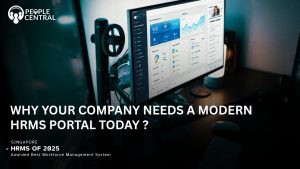Introduction
You know, in tough times when you’re going through the loss of a loved one or maybe a family emergency, real support matters.
One thing I have come to really appreciate is how businesses and companies treat their employees when life gets tough.
Do you know that you may be entitled to compassionate leave if you ever are in such a situation? That is such a supportive gesture. It is also called bereavement leave.
If we talk about Singapore, you’ll be surprised that almost 92% of companies here actually offer it even though it’s not legally required.
I think that says a lot about how the workplace is changing as more companies are realizing that giving people time to deal with their personal lives is important.
So, in this article, let’s learn everything about compassionate leave and how it works.
Is Compassionate Leave Legally Required in Singapore?
No, compassionate leave is not a statutory entitlement in Singapore. The Ministry of Manpower is pretty clear about that. Employers here do not have to provide compassionate leave to employees unless it is written into the employment contract or stated in company policy.
But what I find interesting is that most companies still choose to offer it anyway. I was talking to someone from HR recently, and they said it is not just about rules, it is about recognising that people have real lives and sometimes they need to grieve or handle personal stuff.
And I think such benefits can significantly boost the staff and their trust in the organisation.
What Do Typical Compassionate Leave Policies Include?
So, since compassionate leave is not something the law controls, every company can, and kind of set their own rules for it. But here are a few things that most of them have in common:
Eligibility
Companies usually offer compassionate leave when an employee loses an immediate family member, like a parent, spouse, child, or sibling. But I have also seen some companies who also include grandparents, in-laws, or even a caregiver the employer was really close to. Such flexibility can really mean a lot in somebody’s tough moments.
Duration
Most places offer around 2 to 5 working days of leave. For example, a tech firm might offer three days for the loss of a parent and one day for extended family.
Pay Status
From my experience, most compassionate leave is fully paid, although some companies may offer a mix of paid and unpaid days.
Documentation
And of course, the proof companies usually require proof like a death certificate or obituary to process the leave request.
Also Read: The Rise of the Gig Economy: Trends and Insights
How Some Companies in Singapore are Handling Compassionate Leave
You know, it’s actually pretty interesting how different companies in Singapore approach compassionate leave.
Take the Civil Service, for example. Public servants there get up to 3 days of paid compassionate leave when an immediate family member passes away.
And just recently, in 2023, they expanded that to include grandparents and even grandparents-in-law, which I think really reflects how family structures are changing.
Now in the private sector, companies are offering leave not only for bereavement but also for things like pregnancy loss or when a close family member is seriously ill. It’s a much more compassionate, human way to handle difficult life situations.
Best Practices for the HR Team
When people know their company will support them during tough times, they stay more loyal and engaged.
Here are a few things that work well:
Make the policy easy to understand: Just put everything clearly in the employee handbook. You need to mention all the things about eligibility, the duration of the leave, whether it’s unpaid or paid, and how to apply. No one wants to dig through vague documents when they are already stressed.
Keep the application process simple: It helps when employees can apply online and upload any documents they need. It shouldn’t feel like more of a burden during an emotional time.
Train your managers to respond with empathy: This is a big one. The way a manager might respond to the situation can literally make the person feel supported or totally overwhelmed. So I think it is very important to train managers how to communicate with empathy.
Give some flexibility. Not every situation is the same. Someone might need extra time, right? Maybe they’re dealing with a funeral overseas or just need more days to process everything. Some companies allow people to convert annual leave or take additional unpaid leave.
Support them even after they return. I’ve seen companies offer employee counseling, EAPs, or even a phased return to work. That support can really help someone ease back in.
Making Compassionate Leave Easier With the Right Tools
It can get really tricky when someone needs to be compassionate. Leave on short notice. It is already an emotional time, and then a person has to do all the paperwork, approvals, and coordination to deal with, if you are doing it manually.
That is why I think tools like PeopleCentral can really make a difference. Their leave module lets employees apply for leave online, upload any needed documents, and even track the status of their request. It makes everything so easy and simple.
This way, managers also get notified, and now they can approve the leave without any delay. And for HR teams, everything is locked in real time, which helps with planning and staying compliant.
But the best part? It keeps the whole process transparent and far across departments. No one feels like they are being treated differently, and HR can actually focus more on supporting the person instead of being buried in admin work.
Also Read: The Evolution of Taxation in Singapore 2025: A Historical Overview
Honestly, when a system like this is in place, it shows employees that their company really does care, especially when it matters the most.
Conclusion
In the end, I will just say that compassionate leave is not something companies in Singapore have to offer by law, but still, many do, and for good reason.
I feel that such a thing really helps employees feel that they are supported during their tough times, and it also builds trust between the employee and the employer.
Because when someone is going through a crisis or a loss, even just a few days off can mean a lot. It says a lot about what kind of company you are.








 5
5


























